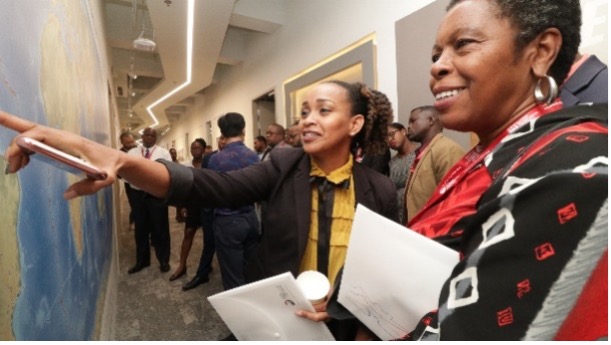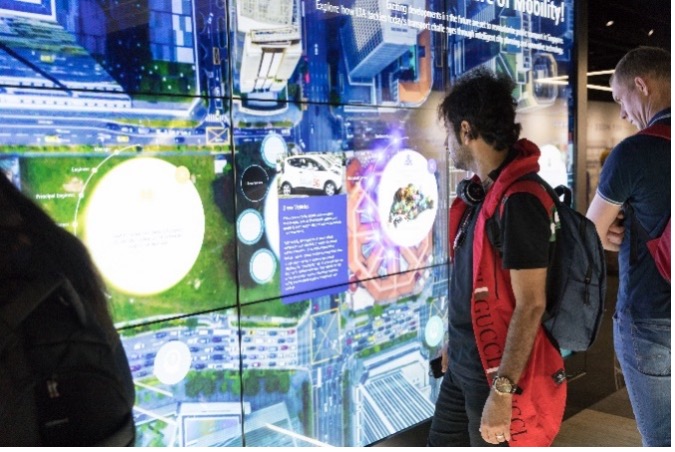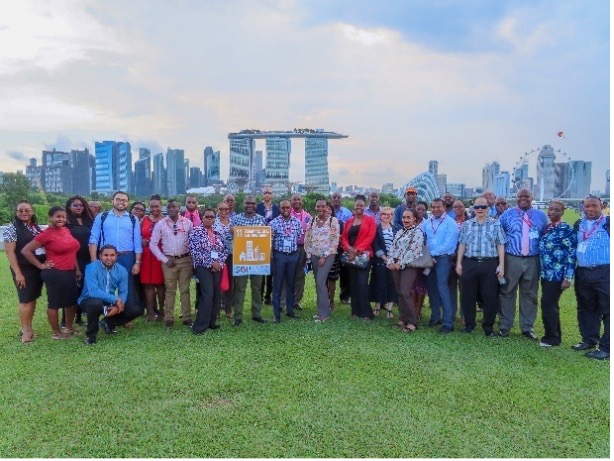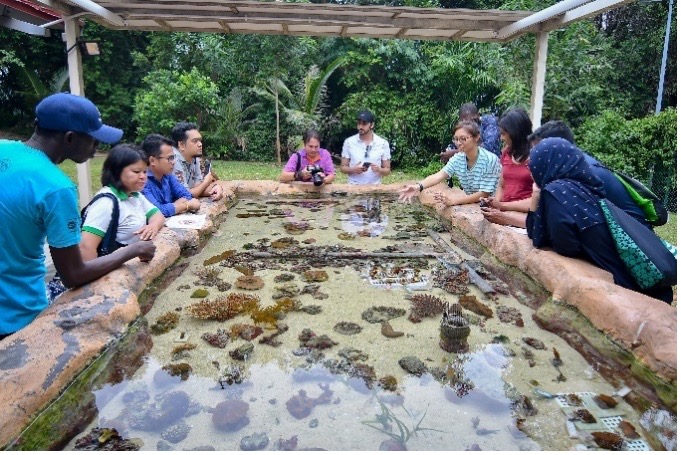 Singapore’s Climate Action Package
Capacity-building programmes to support climate action efforts in developing countries
Singapore’s Climate Action Package
Capacity-building programmes to support climate action efforts in developing countries

Challenges
Climate change is a complex challenge that requires a global and multifaceted response. However, many developing countries lack sufficient capacity to deal with many of the challenges brought about by climate change. The importance of capacity building for developing countries to effectively address climate change is recognized in various international agreements and documents, including the Paris Agreement and the SAMOA Pathway.
The consequences of climate change are far-reaching and affect all countries. They include more frequent extreme weather events, food shortages, forced migration and the emergence of new diseases. Like many Small Island Developing States (SIDS), Singapore is especially vulnerable to the effects of climate change, in particular to rising sea levels and surface temperatures.
Towards a Solution
Singapore strongly believes in the value of capacity building as the best means for fellow developing countries to help each other. The sharing of experiences and best practices has a multiplier effect by allowing participants to learn, adapt and impart knowledge to other policymakers and practitioners within their own countries over the long term.
Thus, in 2018, Singapore launched a Climate Action Package (CAP) under its flagship technical assistance programme, the Singapore Cooperation Programme. The CAP aims to build the capacities of fellow developing countries in areas such as climate change mitigation and adaptation strategies, disaster risk management and stormwater management, with a view to helping them fulfill their Paris Agreement pledges. Most CAP courses are conducted in Singapore, sometimes in partnership with other countries and United Nations agencies. The expertise of various Singapore government agencies are pooled to organize and deliver the courses, and course content is jointly curated with United Nations agencies, where appropriate. Over 600 officials from over 100 countries and territories have attended CAP courses.
Through Singapore Cooperation Programme (SCP), Singapore shares its development experiences, best practices, learning points and latest in- novations, with fellow developing countries. However, recognizing that there is no one-size-fits-all approach to achieving the SDGs, participants are also encouraged to share their own experiences to enrich the learn- ing experience and to adapt what they have learned to suit their own national circumstances. Outcomes observed from the training include: a) participants imparting knowledge to people in their network, including fellow government officials and other stakeholders (e.g., incorporating information from the course into curricula); b) building networks of like-minded people to share best practices; and c) participant requests for follow-up training and workshops, customized for their own coun- tries’ needs. More than 132,000 officials from over 180 countries and territories have attended SCP courses.
An example of a CAP-customised course was Singapore’s partnership with the United Nations Office for Disaster Risk Reduction (UNDRR) to run a programme for participating states of the Caribbean Disaster Emergency Management Agency (CDEMA) on ‘Understanding Risk Management and Risk Financing for Disaster Resilience’ in June 2019. This Training of Trainers course sought to enhance cooperation and increase disaster risk-informed development planning, preparedness and recovery in the Caribbean. The course complemented efforts to support Comprehensive Disaster Management Country Work Plans/National Plans and contributed to the achievement of the global targets of the Sendai Framework for Disaster Risk Reduction (2015-2030), including Target E[1]. This in turn helped participating countries to deliver on the 2030 Agenda for Sustainable Development and the SAMOA Pathway. At the end of the course, UNDRR created a facilitation guide to support participants to replicate the course in their home countries.
Another example of a workshop conducted under the CAP is the ‘Enhancing Nationally Determined Contributions’ workshop that took place in January 2020 in Singapore. The workshop was co-hosted by the NDC Partnership, with support from the United Nations Framework Convention on Climate Change (UNFCCC) Secretariat and the 2050 Pathways Platform. Participants found the workshop to be helpful in guiding their application of agreed UNFCCC reporting guidelines, as well as in the accounting and tracking of the progress of their countries’ nationally determined contributions (NDCs). Furthermore, participants also expressed that the workshop provided an encouraging platform for NDC administrators to share valuable experiences. In the longer term, with sustained participation, workshop attendees can build and develop a cadre of officers oriented towards sustainable development, who could then influence and implement policies to boost collective climate change efforts.
Singapore is constantly looking for opportunities to expand its partnerships with new and existing agencies. For instance, Singapore partners with the United Nations Children’s Fund (UNICEF) to conduct programmes supporting Sustainable Development Goal 6 (Clean Water and Sanitation). In 2019, based on UNICEF’s revised Water, Sanitation and Hygiene mandate, Singapore invited UNICEF to work on the design of a CAP course on ‘Sustainable Integrated Water Resources and Stormwater Management,’ which will be conducted virtually in November 2021.
Although the CAP was initially launched as a three-year programme until 2021, given the strong interest and positive feedback on the courses, it was extended a further two years until 2023. It is this type of result that has encouraged Singapore to remain committed to strengthening the global partnership for sustainable development through technical assistance initiatives.
[1] Target E from the Sendai Framework is a measure that estimates the number of countries and local actors that have DRR strategies in place. Its goal is to “substantially increase the number of countries with national and local disaster risk reduction strategies by 2020”.
Contact Information
Countries involved
Supported by
Implementing Entities
Project Status
Project Period
Primary SDG
Secondary SDGs
Similar Solutions
| NAME OF SOLUTION | Countries | SDG | Project Status | |
|---|---|---|---|---|
Adaptation for Smallholder Agriculture Programme Establishing better working conditions for smallholder farmers through the use of good practices and new technologies |
Global | 08 - Decent Work and Economic Growth 11 - Sustainable Cities and Communities 13 - Climate Action 15 - Life on Land | Ongoing | View Details |
ADAPT PLAN in Malawi |
Global | 01 - No Poverty 05 - Gender Equality 11 - Sustainable Cities and Communities | Ongoing | View Details |
Addressing Racial and Ethnicity-based Discrimination and Strengthening the Protection of Rural Afro-descendants UNFPA supports data disaggregation as a tool to fight racism and ethnic discrimination |
Global | 01 - No Poverty 02 - Zero Hunger 03 - Good Health and Well-being 05 - Gender Equality 06 - Clean Water and Sanitation 11 - Sustainable Cities and Communities 16 - Peace and Justice Strong Institutions | Ongoing | View Details |
Advocacy and Education on Waste Management |
Global | 12 - Responsible Consumption and Production | Ongoing | View Details |
AfDB-Brazil South-South Cooperation Trust Fund A fund to promote South-South partnerships and knowledge-sharing among African countries |
Global | 08 - Decent Work and Economic Growth 10 - Reduced Inequalities 12 - Responsible Consumption and Production 17 - Partnerships for the Goals | Ongoing | View Details |



